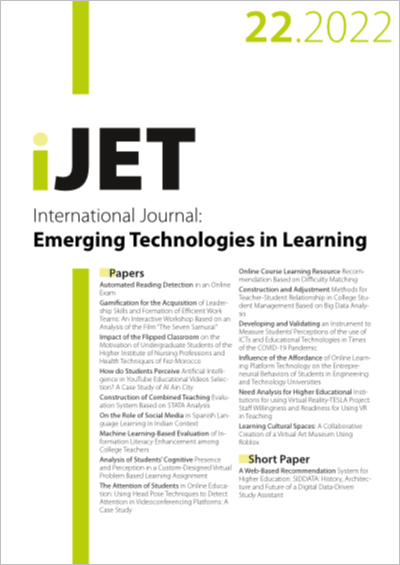Impact of the Flipped Classroom on the Motivation of Undergraduate Students of the Higher Institute of Nursing Professions and Health Techniques of Fez-Morocco
DOI:
https://doi.org/10.3991/ijet.v17i22.33365Keywords:
Inverted Class, Flipped Classroom, Reverse Pedagogy, Hybridization, Digital, Motivation, Teaching, Learning, Active PedagogyAbstract
Motivation is the cornerstone in building success. If it is strong, the achievement of a greater number of objectives will be assured, and therefore a more glorious success can be met. Thus, to promote motivation, it is advisable to pay particular attention to the pedagogical approach adopted by the teacher, since it has been proven that there is a positive relationship between the choice of an active approach and an enhancing motivation. The situation generated by COVID-19, has been a profitable opportunity to experiment with hybrid “Flipped Classroom” pedagogy, with a view to inverting the class and adapting learning activities, that have been traditionally offered to students, through distance (online) and in-person learning alternately. Thus, the present study aims at evaluating the impact of this Flipped Pedagogy on the motivation of undergraduate students of the Higher Institute of Nursing Professions and Healthcare Techniques in Fez. Data have been collected from 410 students, who were questioned before and after the adoption of the Flipped Classroom, based on a motivation scale validated by Rolland Viau in 1994. The answering percentage was of 90.73%. Data analysis demonstrated the existence of a significant relationship between the Flipped Classroom and students' motivation; the motivational profile, which was 18.54%, became 89.25% after flipping the class. The Flipped Classroom can significantly bring a surplus value to pedagogy, hence the importance of broadening its spectrum and integrating it as a new approach of teaching within health sciences educational institutions.
Downloads
Published
How to Cite
Issue
Section
License
Copyright (c) 2022 Rajae Lamsyah, Pr Nabil Kanjaa, Pr Abderrahim El Bouazzaoui

This work is licensed under a Creative Commons Attribution 4.0 International License.


